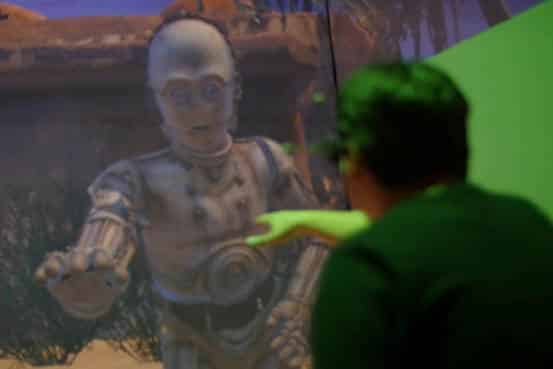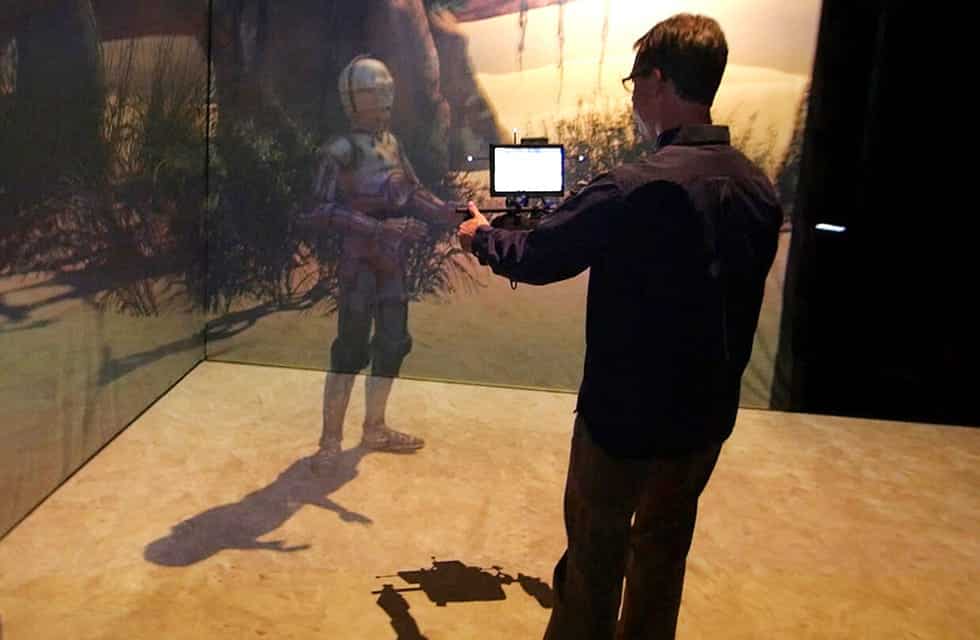
Imagine walking up to a character in a movie and have a conversation with them. No longer a fantasy, the Sundance Virtual Reality project by Lucasfilm is making this a reality for Star Wars fans.
It’s an expansion of the Star Wars universe into virtual reality, but other projects are in the works:
The project is a concerted effort by Lucasfilm, Industrial Light & Magic, and Skywalker Sound to bring a cinematic virtual reality experience to audiences like they’ve never seen before. A new branch of the Lucasfilm company, ILMxLAB, was created to focus on pioneering this immersive new technology in the hopes of eventually making it accessible at theme parks, and even your own living room.
Sundance Virtual Reality and Star Wars
Of course, there’s a paradox here. The studio behind the highest grossing movie of all time has a tech demo in an experimental program. At a film festival for independents, no less. But technology makes strange bedfellows, and virtual reality has caught the attention of the Hollywood studios. Everyone’s a beginner in the virtual space. Some just have a lot more resources than others.

The project is under ILMxLAB, a Lucasfilm division for the Star Wars team. Their new technology is called Holo-Cinema. It’s almost like a form of experiential theatre. But one that allows you to explore an immersive environment, step inside a story and interact with the characters. John Gaeta of ILMxLAB said the
The technology is developed with members of Lucasfilm’s story group, so the experiences feed into the overarching “Star Wars” universe being developed by the group . . . Eventually, the form could be used to build ‘portals’ that explore whole worlds or subplots of the ‘Star Wars’ universe only hinted at in film.
This is thinking outside our current virtual reality mindset. There will be VR films, but studios could do “VR portals” tied to subplots of a film. Or a studio could expand on the elements of a film that are not essential to the overarching narrative. In other words, cinematic narrative could become a framework for storytelling by what we used to call “the viewers”. The possibilities are wide-open here, especially when the audience is no longer dependent on the frames of the cameras.
John Gaeta on Virtual Reality and immersive media
Speaking of possibilities . . .
Since John Gaeta has a hand in the Holo-Cinema, you might want to see an older interview with him at the Palo Alto Film Festival. It covers everything from the history of cinema, the Hollywood business, the failure of Microsoft’s kinect, the 3-dimensional qualities of “flat” photographs and movies, storytelling and games, to the possibilities of technology to transform cinema and entertainment.
Best line, among many (@25:00):
You’ll have a (holographic) elephant walking around your house within three years.
It’s a fascinating journey.
(The video does not play on some mobile devices but you can may be able to access it directly on uStream)
Emory Craig is a writer, speaker, and consultant specializing in virtual reality (VR) and artificial intelligence (AI) with a rich background in art, new media, and higher education. A sought-after speaker at international conferences, he shares his unique insights on innovation and collaborates with universities, nonprofits, businesses, and international organizations to develop transformative initiatives in XR, AI, and digital ethics. Passionate about harnessing the potential of cutting-edge technologies, he explores the ethical ramifications of blending the real with the virtual, sparking meaningful conversations about the future of human experience in an increasingly interconnected world.

Hi
Thanks for the kind words and thanks for seeing the installation at sundance. PS this video is from 2011 and re posted in 2015 which I did not realize until I saw your post here. It is incorrectly titled as it was years before I decided to join lucasfilm.
cheers jg
Thanks John. If there’s a more current video or another that we should highlight, let us know! In addition, I wish there was a version of the Palo Alto Film Festival interview outside of ustream. Not everyone is able to view it.